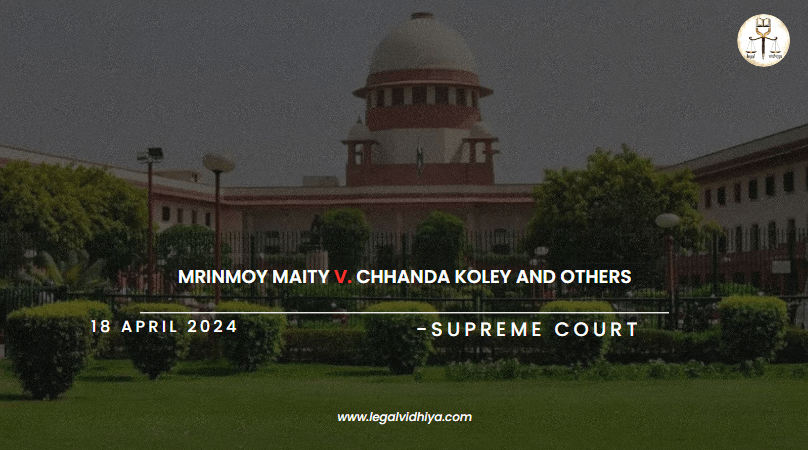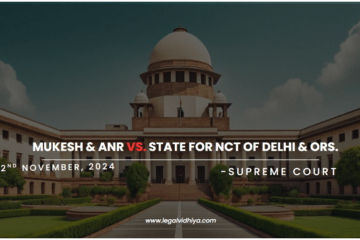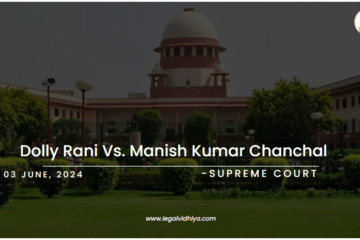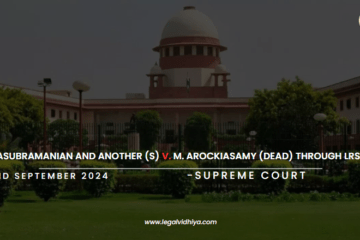
| CITATION | 2024 SCC OnLine SC 551 |
| DATE OF JUDGMENT | 18 April 2024 |
| COURT | Supreme Court of India |
| APPELLANTS | Mrinmoy Maity |
| RESPONDENTS | Chhanda Koley and Others |
| BENCH | Justice Pamidighantam Sri Narasimha and Justice Aravind Kumar |
Introduction: –
The is the case of dispute regarding the allocation of an LPG distribution in Jamalpur, District Burdwan. In this the appellant applied for the distributorship in response to an advertisement issued 9.9.12. After this in the draw of lots it was held that on 11.05.2013, the appellant was the successful candidate and was granted approval for starting distributorship on 3.06.2014. After four years the respondent filed a complaint alleging that the land offered by the appellant is not good for the construction and due to this appellant providing them a different land which was accepted by them. The respondent, being aggrieved by the decision of corporation to permit the appellant to commence construction on the alternate land, filed a writ petition in 2017. This petition was dismissed on the ground of lack of locus standi, but an intra-court appeal led to the appellate court setting aside the allotment made in favour of the appellant.
Facts of the Case: –
1. An advertisement was issued on September 9, 2012, inviting applications for an LPG distributorship under the GP Category at Jamalpur, District Burdwan.
2. Among the eligible applicants, the appellant (Mrinmoy Maity) and respondent No. 1 (Chhanda Koley) were found eligible, and a draw of lots was held on May 11, 2013, in which the appellant was successful.
3. A letter of intent was issued to the appellant on February 24, 2014, and approval was granted by BPCL on June 3, 2014, for starting the LPG distributorship.
4. Four years later, in 2017, respondent No. 1 filed a complaint alleging that the land offered by the appellant was a Barga land and could not be considered.
5. The appellant offered an alternate land, which was accepted by the Corporation, and he was permitted to construct the go down and showroom on the alternate land.
6. Respondent No. 1, being an unsuccessful applicant, filed a writ petition in 2017, challenging the decision of the Corporation to permit the appellant to commence construction on the alternate land.
7. The Single Judge dismissed the writ petition on the ground of lack of locus standi, but the Division Bench allowed the appeal and set aside the allotment made in favor of the appellant.
Issues Raised: –
1. Whether the writ court was justified in entertaining the writ petition filed by respondent No. 1, challenging the approval granted for starting the LPG distributorship.
2. Whether the doctrine of delay and laches should be applied in exercising discretionary powers under Article 226 of the Constitution.
Contentions of the Parties: –
- Appellant’s Contentions:
1. The Single Judge rightly dismissed the writ petition on the ground of lack of locus standi and dissolved the interim order.
2. The Division Bench erred in ignoring the aspect of delay and laches exhibited by the writ petitioner and extended the olive branch based on conjectures.
3. The writ petitioner was aware of all developments, including the allotment in favor of the appellant in 2014, yet did not challenge it until 2017.
4. The appropriate government permitted flexibility in the selection guidelines, allowing applicants to offer alternate land, which was followed in the present case.
- Respondent’s Contentions:
1. The blatant violation of the guidelines goes to the root of the matter, and the inherent defect cannot be rectified by relying on a subsequent amendment to the guidelines.
2. The rules of the game cannot be changed after the commencement of the game, which was done by the Single Judge and rightly found improper by the Division Bench.
Judgment: –
The Supreme Court held that the writ petition ought to have been dismissed on the ground of delay and laches itself.
The court held that delay defeats equity, and delay or laches is a factor to be considered while exercising discretionary powers under Article 226. An applicant who approaches the court belatedly ought not to be granted extraordinary relief by writ courts. If the delay is not satisfactorily explained, the High Court may refuse to invoke its extraordinary powers. In the present case, the writ petitioner was aware of all developments since 2014 but did not challenge them until 2017, thereby allowing her rights, if any, to drift away or acquiescing in the acts of the Corporation. The appropriate government permitted flexibility in the guidelines, allowing applicants to offer alternate land, which was followed in the present case. The Corporation exercised its discretion in accepting the alternate land offered by the appellant, and there was no reason to substitute the court’s view for that of the experts. Accordingly, the Supreme Court set aside the order of the Division Bench and restored the order of the Single Judge, dismissing the writ petition on the ground of delay and laches.
Analysis: –
The Supreme Court’s decision in the present case reaffirms the well-established principle that delay and laches are significant factors to be considered while exercising discretionary powers under Article 226 of the Constitution. The Court rightly emphasized that an applicant who approaches the court belatedly, without a reasonable explanation, ought not to be granted extraordinary relief by writ courts.
The Court’s approach is in line with its earlier decisions, such as Tridib Kumar Dangal and others v. State of W.B and others (2009), Karnataka Power Corporation Ltd. and another v. K. Thangappan and another (2006), and Chennai Metropolitan Water Supply & Sewerage Board and others v. T.T. Murali Babu (2014), where it has consistently held that delay and laches can disentitle a party from seeking discretionary relief under Article 226.
Furthermore, the Court rightly took into account the change in policies and the flexibility introduced by the appropriate government, which allowed applicants to offer alternate land. The Corporation’s decision to accept the alternate land offered by the appellant was based on its expertise and discretion, which the Court refrained from substituting with its own view.
The decision underscores the importance of adhering to the principles of equity and fairness in exercising discretionary powers under Article 226. It serves as a reminder that writ courts should not indulge litigants who approach the court belatedly and seek to rekindle lapsed causes of action, as such an approach would undermine the principle of certainty and finality in legal proceedings.
Conclusion: –
The Supreme Court’s decision in Mrinmoy Maity v. Chhanda Koley and Others reaffirms the significance of the doctrine of delay and laches in exercising discretionary powers under Article 226 of the Constitution. The Court’s approach is well-reasoned and aligned with established legal principles, emphasizing the importance of adhering to principles of equity, fairness, and finality in legal proceedings.
The decision serves as a reminder to litigants to approach the court promptly and assert their rights within a reasonable time, failing which they may be disentitled from seeking extraordinary relief under Article 226. It also highlights the need for courts to exercise caution and discretion in entertaining stale claims or permitting indolent litigants to take advantage of their own wrongs.
Overall, the case reinforces the principles of certainty, finality, and fairness in the administration of justice and underscores the importance of balancing the rights of litigants with the broader interests of justice and public policy.
Reference:
1. SCC Online.
2. https://www.livelaw.in/supreme-court/article-226-delay-defeats-equity-hc-should-
dismiss-writ-petition-if-petitioner-is-guilty-of-delay-or-laches-supreme-court-255643.
This paper is written by shivam kumar Sahu from central university of Kashmir.
Disclaimer: The materials provided herein are intended solely for informational purposes. Accessing or using the site or the materials does not establish an attorney-client relationship. The information presented on this site is not to be construed as legal or professional advice, and it should not be relied upon for such purposes or used as a substitute for advice from a licensed attorney in your state. Additionally, the viewpoint presented by the author is of a personal nature.




0 Comments